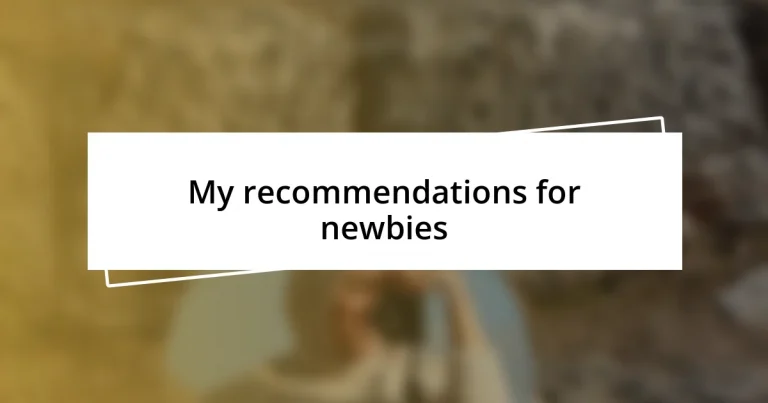Key takeaways:
- Breaking down learning into manageable chunks and setting regular practice times fosters confidence and mastery of skills.
- Building a support network and finding mentorship can significantly enhance personal growth and provide guidance through challenges.
- Setting achievable goals using SMART criteria and celebrating small wins maintains motivation and leads to sustained progress.

Getting Started with Basics
When I first entered this world, I often wished someone had handed me a cheat sheet for the basics. It’s easy to feel overwhelmed at the start; I remember staring at a plethora of tools thinking, “Where do I even begin?” Focusing on a few essential skills, rather than getting lost in the details, can make the early stages less daunting.
One thing that really helped me was breaking everything down into bite-sized pieces. For instance, I set aside a specific time each day just to learn one new concept. It became a sort of ritual for me, and over time, I transformed that initial confusion into a sense of achievement. Have you ever found that focusing on small wins instead of the big picture can build your confidence?
I can’t stress enough the importance of practice—it’s truly the cornerstone of getting started. Just like learning to ride a bike, you’re bound to wobble a bit at first. Don’t let those little stumbles discourage you! Each small attempt is a step closer to mastering the basics, and trust me, every expert was once a newbie, just like you.

Essential Tools for Newbies
When I was starting out, I found that having the right tools can make all the difference. I remember my first foray into this field; I felt a mix of excitement and confusion at the various options available. Tools that simplify tasks, like project management apps, have significantly improved my workflow. They keep me organized and motivate me to stay on track—something that’s essential when you’re just beginning.
I vividly recall struggling with communication when I was new. Using reliable messaging platforms not only helped me stay connected with others but also created a supportive community. It felt like having a safety net that caught me during those uncertain moments. Choosing the right tools can turn daunting challenges into manageable tasks, allowing you to build your skills with confidence.
Perhaps the most crucial tool in my arsenal was a good learning resource—be it a course or a book. I can’t count the times I turned to my favorite learning platform, which became my go-to guide during those initial moments of self-doubt. Having a solid resource gave me the reassurance that I wasn’t navigating this journey alone.
| Tool | Purpose |
|---|---|
| Project Management App | Organizes tasks and boosts productivity |
| Messaging Platform | Facilitates communication and collaboration |
| Learning Resource | Provides guidance and knowledge |

Tips for Effective Learning
When I think about effective learning, a few key strategies come to mind that really made a difference for me. One approach that I found invaluable was the concept of active engagement. Instead of passively reading or watching tutorials, I began taking notes and summarizing what I learned. This seemed simple, yet writing things down transformed my understanding into something tangible. I vividly remember periods where I’d look back at my notes and feel a rush of pride at how much progress I made through that active involvement.
Here are some effective tips I learned along the way:
-
Set Clear Goals: Break your learning journey into specific, actionable goals. Instead of saying, “I want to learn,” try, “I will learn X by the end of the week.”
-
Practice Regularly: Just like building muscle, consistent practice is essential. I set aside dedicated times throughout the week to focus solely on what I was learning.
-
Teach What You Learn: Explaining concepts to someone else solidified my understanding. I often grabbed a friend or even talked to myself!
-
Seek Feedback: Don’t shy away from constructive criticism. I remember feeling nervous when sharing my ideas, but the feedback I received was invaluable and helped me refine my skills.
-
Stay Curious: Keep an open mind and allow your interests to lead the way. I found that following what intrigued me most resulted in deeper learning and retention.
Embracing these strategies has provided me with a sense of empowerment, knowing that with each step, I’m one step closer to expertise. Effective learning is more than just absorbing information; it’s about cultivating a mindset that keeps you curious and engaged.

Building a Support Network
Building a support network was one of the turning points in my early journey. I recall reaching out to a few like-minded individuals on social media who were also navigating their paths. It felt comforting to share my challenges with people who understood my struggles. Have you ever felt isolated in your journey? You’re not alone, and creating connections can truly make a world of difference.
Another fundamental aspect I learned was the importance of mentorship. I was fortunate enough to connect with someone who had already traveled the road I was on. Their encouragement and advice were invaluable. I often think back to the pivotal moment when they shared their own missteps; it reminded me that everyone faces obstacles, and having someone to help guide you can truly alleviate the pressure.
Lastly, attending local meetups or workshops became a game-changer for me. Each event was charged with energy, as I met inspiring individuals who sparked new ideas. I remember one particular session when a stranger became a collaborator, leading to a project I never would have attempted on my own. Do you feel hesitant about reaching out to strangers? Embrace that discomfort; it might just open the door to unexpected opportunities.

Overcoming Common Challenges
Overcoming challenges is part of the learning process, and it often feels daunting. I remember my early days grappling with self-doubt whenever I faced a tough concept. I’d catch myself wondering, “Am I really cut out for this?” However, instead of shying away, I learned to embrace those feelings as a sign that I was pushing my boundaries. It’s amazing how shifting my mindset from seeing challenges as threats to viewing them as opportunities made all the difference.
A significant hurdle for many, including myself, is the fear of failing. I’ll never forget the time I submitted a project I was uncertain about, only to receive constructive critiques that initially stung. Yet, it was through those critiques that I saw the path to improvement. I often ask myself, “What’s the worst that could happen?” and the answer always brings clarity; it’s a chance to grow. Learning to accept failure as part of the journey can liberate us in ways we never expect.
Time management can be another tough nut to crack. In my experience, juggling multiple responsibilities felt overwhelming at times. I often found myself wondering if I could balance everything effectively. My breakthrough came when I started scheduling dedicated time blocks just for learning. This simple strategy restored my sense of control and helped me tackle tasks one at a time. Have you tried breaking your day into manageable segments? It can turn chaos into clarity.

Setting Achievable Goals
Setting achievable goals is vital for maintaining motivation and direction. I remember the time I set myself a lofty goal of completing a complex project in just a week. It sounded exciting at first, but as the days passed, I felt increasingly stressed and overwhelmed. In hindsight, I realized that breaking it down into smaller, manageable tasks would have led to a more satisfying journey. Have you ever found yourself in a similar situation?
One effective approach I adopted was the SMART criteria—Specific, Measurable, Achievable, Relevant, and Time-bound. For example, instead of saying, “I want to learn a new skill,” I shifted to, “I will practice this skill for 30 minutes each day for the next month.” This tangible goal not only clarified my focus but also kept me accountable. I often look back and think about how setting clear, specific goals transformed my daily motivation.
Reflecting on my own experience, I also learned the importance of celebrating small wins. When I completed a task or reached a minor milestone, I would take a moment to recognize and appreciate my effort. This practice boosted my confidence and helped me stay on track. So, how do you reward yourself? Think about incorporating small celebrations into your own journey—they can make the path feel much more enjoyable.

Continuing Education and Growth
Continuing education is not just about attending formal classes; it’s a mindset I adopted early on that transformed my professional life. I vividly remember the first time I took an online course to fill a skills gap—I was anxious but excited. Halfway through, I realized that I was not just learning content; I was expanding my network and connecting with others who faced similar challenges. Have you ever considered how continued learning can open doors that you didn’t even know existed?
In my journey, I’ve found that growth often comes from unexpected places. There was a time when I decided to join a local book club focused on personal development. To my surprise, the discussions sparked insights that I later applied to my work. Engaging with others brought fresh perspectives that I had never considered before. Isn’t it fascinating how stepping outside our comfort zone can lead us to discover new strengths and ideas?
I can’t stress enough how vital mentorship has been for my continuous growth. When I reached out to a more experienced colleague, I expected to learn the ropes, but what I gained was much more profound. Their feedback challenged me to think critically and pushed me beyond my limits. It made me ponder—are we fully utilizing the expertise around us? Finding a mentor might just be the key to unlocking your potential.














